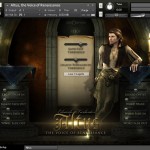Today we are going to take a look at the third solo vocal library from Eduardo Tarilonte called Altus – a unique solo vocal library featuring José Hernández Pastor. Is the third instalment up to par with the previous libraries Eduardo Tarilonte has released or is it something you should pass on. Let us have look.
Content

Again the library is divided into three parts; Voice, Phrases and Soundscapes all of which sound really nice, but let us have a closer look on how you will be using them.
The Voice
As I was impressed with Cantus, I was more surprised here when I heard Altus for the first time. I couldn’t wrap my head around its voice. I don’t mean that in a bad way but more of how different it sounds from any other library I heard. Never the less, Altus sounds great and most importantly it sounds authentic. If you ever bought any of the Tarilonte`s libraries you know that this developer will go an extra mile to bring the true authenticity to your doorstep.
Altus features the now well known five true legatos A, E, I, O, U, and a word builder with more than 130 words and syllables. The voice has two articulations (fast and slow) which are triggered via keyboard when you play softly (portamento or slow spead) or loudly (fast).
Like with previous vocal libraries the solo patch is played with the help of key switches and a word builder. At the bottom of your keyboard scale you will find all five legatos above it you will find various predetermine phrases. One octave is the actual voice and at the higher end of the keyboard scale you will find various breaths and inhales.
The voice samples sound as I have mentioned great and if you were ever worried that Altus might suffer from lack of quality I can put your mind to ease. The quality of the sample again is simply stunning and Eduardo surely manages to bring authenticity to your studios.
Phrases
The phrase patch offers 130 beautiful phrases which can be switched via key switches on your keyboard. Samples are great and the patch doesn`t really take any extra toll on your CPU. Unlike Cantus, Altus is much smaller in size and in my opinion a bit better optimized. More on that in the graphic interface part of this review.
Soundscapes
The soundscapes patch is comprised of three voice samples and one pad sample and they really sound great together. I have to say that these soundscapes are one of my favourite of the three vocal sample libraries. In my opinion this is where Altus shines best. The one thing I would love to see is the ability to switch various Altus and pad samples although Soundscapes patches do offer some variety. There are thirteen patches all together and all have some kind of unique “vibe” that makes them a bit different from the rest (voice samples playing the major part here).
Graphic interface

The word builder offers the same options as Cantus word builder does but I have to admit that with Altus you can hear the phrases much better which, in my opinion, is due to the nature of the voice itself. This time I will skip the detailed overview/review of the word builder as I have covered it in the Cantus review, though as I have mentioned there is little to no difference between one and the other.
At the first glance Altus is not very different from Cantus but there were some changes made in the backend. You can now assign any word/syllable to any of the legato vowels which will make your compositions sound even more realistic. Altus also seems a bit lighter on the CPU than Cantus (though Cantus is a bigger library) and lower end machines should cope with it just fine.
Ease of use
Like with previous vocal libraries (Shevannai and Cantus), Altus will take some time to master. The graphic interface is easy to understand but the usage of the voice will not be. Overall it shouldn`t take you more than a week to master Altus plus the developer also provided a nice tutorial videos in case you find yourself in a dark.
Price/Value
Altus is priced at 149 EUR for both boxed and the digital versions of the sample library and I personally feel that the price like with Cantus and Shevannai is about right. The quality of Tarilonte`s libraries is just amazing and Altus is no exception.
Not long from now I think Best Service might even have a good deal on all three libraries and if that day comes be sure to be there to grab it as it is worth every penny.
Conclusion
Altus is a great sounding and very high quality library and although it may not be everybody’s cup of tea (due to the nature of the voice) it is worth giving it a try. It is light on the CPU and it has a simple but great graphic interface. You do not even need a full version of Kontakt to run it as it works with Kontakt player as well.

